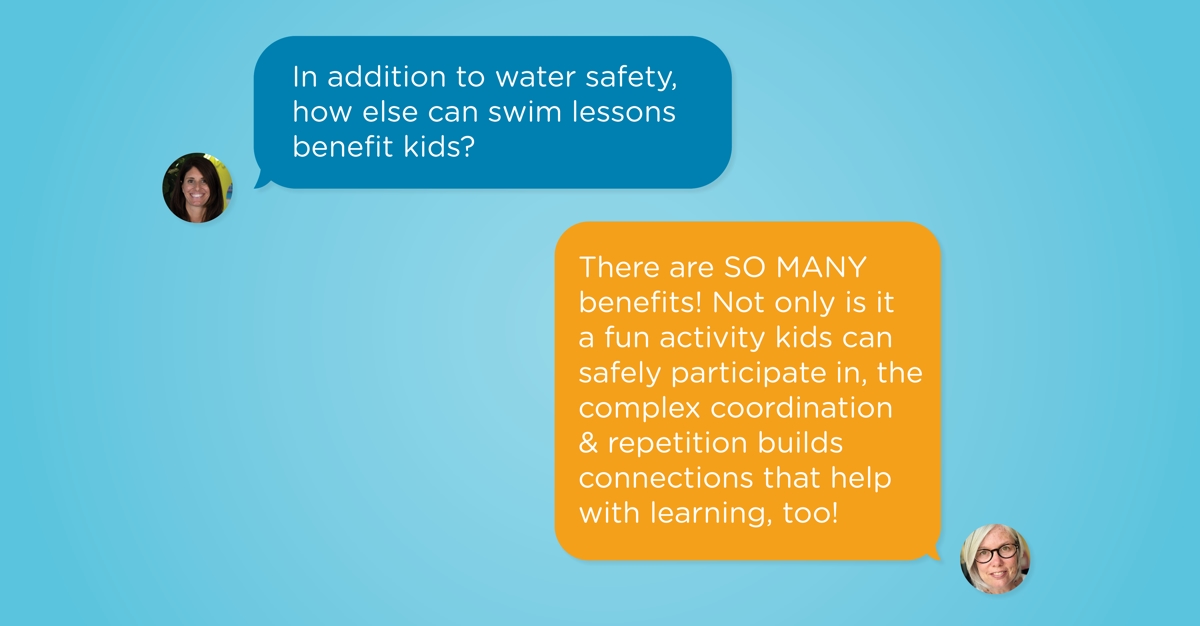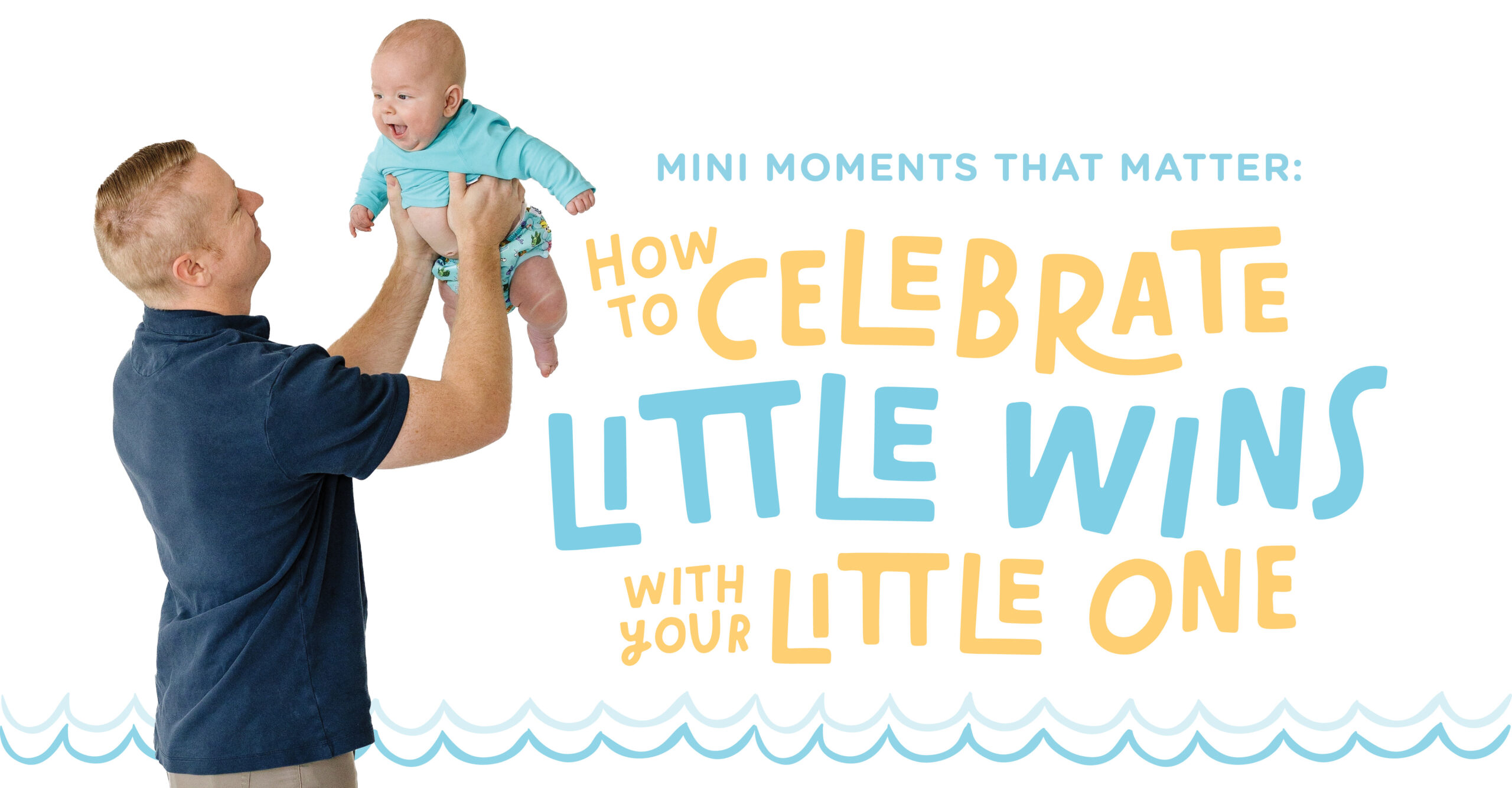Dr. Molly Answers Your Swimming & Water Safety Questions

As a board-certified pediatrician at Birmingham Pediatrics + Wellness Center, and the official pediatrician of Goldfish Swim School, parents turn to Dr. Molly O’Shea for advice on everything from tummy time and screen time to nutrition and water safety. In honor of National Doctor’s Day, we invited her to join our Curriculum Development Manager for a special Q&A to discuss how parents can help prepare their children for a lifetime of water safety, and the additional benefits swim lessons provide!
Thank you to everyone who submitted questions and tuned in to join us live! If you missed the live Q&A, read on for a recap of the conversation and be sure to watch the full recording on IGTV.
Q: Parents look to pediatricians for guidance on many things, why shouldn’t water safety be any different?
When enjoyed safely, water can be a lot of fun. However, the unfortunate reality is that drowning remains the number one cause of injury-related death for children under four, and a leading cause of death for adolescents-which is why educating parents about water safety and discussing drowning prevention strategies during wellness visits is just as important as discussing car seat safety or sleep safety. I’m glad to see Goldfish’s Rx program is helping pediatricians across the country provide parents with helpful water safety resources and materials.
Q: What can parents do to start preparing their families for a safer summer?
Spring is here and summer is just around the corner. With temperatures heating up, families will be spending more time at local beaches and backyard pools, putting water safety top of mind for many parents. Now is the time to begin preparing your kids for all the wonderful water-related adventures that await!
Talk to your kids about water safety
Use bath time as an opportunity to talk to your kids about what it means to be safe in and around water! Just like they’re not allowed to be in the bath alone, explain that an adult needs to be with them any time they want to go swimming or near water. Reminding them of the rules will help reinforce safe behavior when it’s time to head to the beach or pull out the kiddie pool.
Practice getting comfortable with water safety devices
It takes time for children to get used to new things, and wearing a life jacket can feel uncomfortable at first. Take the stress out of a new situation by making the act of trying on their U.S. Coast Guard-approved life jacket a fun experience. After all, you don’t want the first time they wear it to be a situation where they have to wear it.
Enroll your children in swim lessons
While drowning prevention requires layers of prevention, swim lessons have been shown to help reduce the risk of drowning by 88%. In fact, learning to swim is such an important drowning prevention strategy that the American Academy of Pediatrics (AAP) recently updated their recommendations for preventing drowning to reinforce the importance of starting swim lessons at a young age.
Sign your children up for swim lessons now so they can start learning essential water safety skills they need to be safer, more confident swimmers by the time summer rolls around. Even if you think your child “knows” how to swim, ask yourself these 10 questions. If your answer to any of them is “no”, your child would benefit from additional instruction.
If your child hasn’t taken swim lessons before, help them prepare for what class will be like. Practice some of the sensory experiences of swimming in the bathtub by having them blow bubbles, splash in the water or float on their back.
Educate yourself about water safety
Whether it’s choosing the right life jacket, understanding the signs of drowning or determining which age to begin swim lessons, water safety education is just as important for parents as it is for kids.
Q: From your medical perspective, do you think swimming is a safe activity for kids right now?
Swim lessons are much different than swimming for fun at a community pool or party. Swim lessons are structured and delivered in a way that enhances safety because swim schools, like Goldfish, have the ability to provide a controlled learning environment in accordance with public health requirements.
The safety measures that are being taken – smaller class sizes, social distancing, additional sanitization, PPE for instructors – reduce the risk of spreading illness; and, according to the Centers for Disease Control and Prevention (CDC) there is no evidence COVID can be transmitted in pools since proper operation, maintenance and disinfection of the water with chlorine should remove or inactivate the virus. Industry experts have also indicated that indoor swimming pools are better ventilated than many other indoor spaces. And, with vaccines becoming more widely available parents and instructors will soon have the opportunity to get vaccinated, further reducing the risk of spreading the virus.
With all of this information in mind, I do feel swim lessons are a safe activity for children in the midst of the pandemic. Considering the risk of drowning relative to the risk of COVID, continuing to provide children with the ability to learn a skill that could one day save their life should remain a priority as families evaluate options for safe activities during this unique time.
LEARN MORE ABOUT GOLDFISH SWIM SCHOOL’S COVID SAFETY PROTOCOLS
Q: In addition to water safety, what other benefits do swim lessons provide?
There are so many extra benefits that come with taking swim lessons! Not only is it a fun activity kids can safely participate in, the complex coordination and repetition used during lessons builds connections in the brain that help with learning, too!
I know it can be hard to sit on the side of the pool and watch your kids do the same things over and over, especially when you think they’re ready to move onto another skill. But, repetition is so important! We wouldn’t expect our kids to ride a bike, tie their shoes or learn how to write their name without plenty of practice. Learning to swim, and do so properly, is the same way!
As a parent, I’m guessing you probably have a certain book or movie memorized by heart because your kids like to watch it, or read it, so much. As annoying as this may seem, have you ever stopped to wonder why they enjoy doing the same things over and over again?
Kids find comfort in the familiar, and as their brains develop they gain something new every time they watch, read or do the same thing. That’s because children need to repeat things over and over in order to build a strong neurologic pathway. While they’re strengthening that pathway, they’re also building more connections and little side roads in the brain that enhance other rote learning activities, such as memorizing sight words and rudimentary math facts, as well as problem solving strategies. Simply put, swim lessons can help children create connections and find detours around other learning roadblocks they may be experiencing.
Q: In a year where it’s been difficult to stay in touch with friends, how can parents help provide their kids with safe ways to socialize with other children their age?
Socialization is such an important part of child development, but the pandemic brought that to quick halt, leaving many parents wondering if their children are deprived of an important developmental step – peer-to-peer interaction.
In addition to finding virtual options for socializing, parents are vetting in-person activities for safety that will give their children opportunities for building relationships based on shared experiences. In person opportunities provide the best chance for kids to connect and form relationships, and shared interests and activities are a great way for kids to find their next great friend!
Due to their structured nature, and the safety protocols in place, swim lessons are an example of one non-contact activity that can provide kids with a safe way to socialize during this time. And, warmer weather on the horizon means more opportunities to be with friends outdoors in a safe manner while wearing masks.
Prepare Your Family for a Golden Summer With Swim Lessons at Goldfish
swim lessons provide a safe, fun and educational activity where kids learn important life skills. Talk to your pediatrician, practice water safety at home and consider signing your child up for swim lessons at a local Goldfish Swim School near you as a way to help them develop a healthy respect for the water and build skills that will give them the confidence they need to make waves in life!
Dr. Molly O’Shea is a board-certified pediatrician and owner of Birmingham Pediatrics + Wellness Center in Bloomfield Hills, MI and Campground Pediatrics + Wellness Center in Washington Township, MI. Dr Molly has been in practice for over 25 years and has served at the state and national levels for the American Academy of Pediatrics. She was the ‘Ask the Pediatrician’ columnist for the Detroit News for many years and was a journal editor as well. Dr Molly is a lifelong swimmer, former triathlete, wife and mother.



